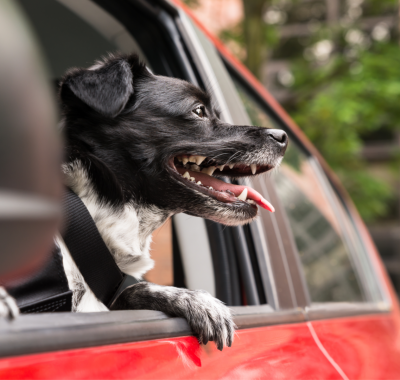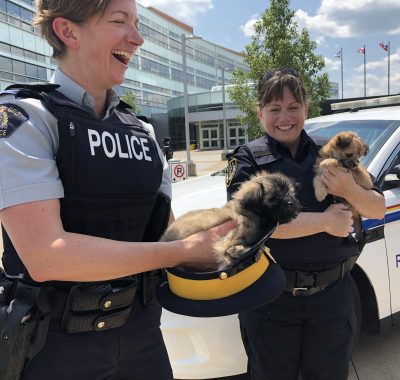“I thought I’d run into the store for just one thing, but I got stuck in a long line-up.” Every year, pets suffer and die needlessly when their guardians make the mistake of leaving them in a parked car on a warm day – even for “just a minute”- while they run an errand.

NEVER leave your pet unattended in a vehicle during the summer heat. Parked cars in warm weather are deathtraps for pets. Animals don’t sweat; they must rely on panting to remove heat from the body. High temperatures make it difficult for pets to cool themselves and heatstroke can be fatal. Short-nosed dogs, senior pets and those with health issues are even more at risk, along with overweight pets and those with thick or dark coats.
Temperatures rise alarmingly fast inside a parked vehicle. Even on mild days or in the shade, car windows act as a greenhouse, causing temperatures inside the car to soar quickly to dangerous levels. On a 23◦C day, the temperature inside a parked car can soar to 34◦ very quickly, and on a 32◦C day the interior temperature can reach as high as 43◦C in just 10 minutes! At these temperatures, your pet can suffer severe heatstroke, irreversible brain and organ damage… or worse.
Our SPCA Enforcement Officers joined forces with the Nova Scotia RCMP and sat inside a vehicle on a warm day for 20 minutes to show just how dangerous it is. Watch their experience below.

If these numbers aren’t enough to convince you to leave your pet at home in warm weather, maybe this fact will. Thanks to regulations in Nova Scotia, people who leave their pet in an unattended vehicle in conditions that cause distress will be fined $697.50.
What should you do?
If you see an animal in distress in a parked vehicle, here are the steps to take:
- Assess the situation. Signs that a pet may be in distress from overheating include exaggerated panting, rapid breathing, drooling, dark pink gums, lack of coordination, inability to get up, vomiting, convulsions or collapse.
- Note relevant information:
- vehicle’s description – make, model, license plate, color, exact location
- pet’s description – species, size, color, breed (if known).
- Try to locate the owner first. Ask the nearest stores/businesses to make an announcement for the owner to return to their car.
- If you cannot find the owner and the animal is in distress, call your local police or RCMP and stay at the vehicle until police arrive.
- File a report with the Nova Scotia SPCA online here or by calling 1-888-703-7722
What should you NOT do?
- Do not break the windows. While you understandably may have the urge to smash the window to free the distressed pet, you could be liable for damages. Only the RCMP, local police and the Nova Scotia SPCA have the authority to enter a vehicle lawfully to help a pet in distress.
- Do not consider air conditioning or the windows cracked open as an option. This is not a guaranteed safe solution since pets have died as a result of a malfunctioning system (not to mention being stolen along with the car).
How can you help?
- Help us spread the word! Share our video and article on social media and tag us on Facebook @NSSPCA on Twitter @NSSPCA on Instagram @NOVASCOTIASPCA or e-mail to a friend
- If you plan to run an errand (no matter how quickly) that your pet can’t accompany you on, keep them safe and cool at home.
- If you have your pet with you, shop at dog-friendly businesses, restaurants or accommodations. We’ve compiled a list here for you!
Please remember – while you may think you’re making your pet happy by bringing them along for the ride, you could very well be jeopardizing their life. No more excuses, no more pets in hot cars!

